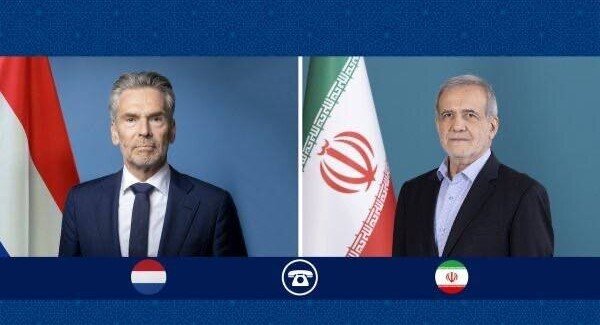Iran President, Dutch PM talk regional tensions, nuclear deal

TEHRAN – The Iranian President and Dutch Prime Minister engaged in a telephone conversation on Sunday to address key issues of mutual concern, including the rising tensions in the region, and strategies for resolving impasse surrounding the Joint Comprehensive Plan of Action (JCPOA).
During the telephone call on Sunday, Masoud Pezeshkian responded to Prime Minister Dick Schoof's outreach by highlighting the 400-year history of diplomatic ties between Iran and the Netherlands.
Pezeshkian remarked, “My government is committed to elevating our relations and fostering cooperation with neighboring countries and the global community. We can achieve this by leveraging our existing capabilities to deepen and expand our bilateral ties.”
Iran’s president also referenced the stance of Western nations, including the Netherlands, regarding the actions of the Israeli regime in Gaza and Lebanon and stated, “I was elected as the president of the Islamic Republic of Iran with a mandate for domestic unity and global friendship. However, on my first official day, the Israeli regime, seeking to divert attention from its failures in Gaza and escalate regional tensions, assassinated our guest in Tehran.”
“Instead of condemning these terrorist actions, Western countries, led by the United States, continue to urge us to show restraint,” Pezeshkian stated.
In the same conversation, Prime Minister Dick Schoof expressed, “We firmly believe that the East Asia cannot endure further tensions, and we have called on all parties to avoid escalating conflicts.”
Schoof emphasized that the Netherlands has urged Israel to agree to a ceasefire in Gaza promptly and has supported the U.S. initiative for a ceasefire in Lebanon.
A year of Israel’s war in Gaza has left over 41,000 people dead and the entire Gaza Strip in ruins. The regime has also spread its violence to the surrounding areas, especially Lebanon where it’s begun to target hospitals and other civilian its.
Elsewhere in his remarks, Iran’s president highlighted in another section of his address that the Islamic Republic of Iran aims to enhance its relationships and collaboration with neighboring nations and other countries globally, including those in Europe, through dialogue while tackling specific matters such as Iran’s nuclear issue.
The Dutch Prime Minister also conveyed his satisfaction with Iran's willingness to resume its nuclear obligations under the JCPOA framework and underscored the importance of making concrete progress in this area as the most effective measure for the fourteenth government during this challenging time in the West Asian region.
The JCPOA often known as the Iran nuclear deal, is a landmark agreement established in July 2015 between Iran and the P5+1 nations, which include China, France, Germany, Russia, the United Kingdom, the United States, and the European Union.
As part of the JCPOA, Iran committed to substantial restrictions and monitoring of its nuclear activities in return for the termination of Western sanctions.
Nevertheless, the agreement has encountered significant difficulties since its inception, particularly after the United States exited the deal in 2018 during President Donald Trump's tenure. This withdrawal resulted in the reinstatement of sanctions against Iran, prompting the country to begin scaling back its compliance with the JCPOA in 2020.
Leave a Comment